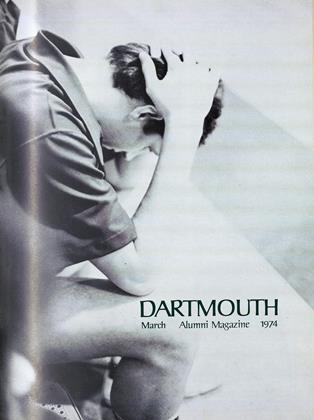THE CHALLENGE: President-elect John Kemeny's 1970 call on the business comunity to sponsor for its executives "periods of intellectual refreshment and mindstretching," akin to academia's sabbaticals and on the College to initiatea program that would offer business and professional leaders "an opportunity to catch up with the world, to rethink their lives, to have time for meditation, and to replenish intellectual reserves."
THE RESULT: The Dartmouth Institute, a for-week highly organized liberal arts curriculum, hailed as a pioneering innovation in continuing education at its inception in 1972, recognized as a proven success as it approaches the start of its third season. June 30 in Hanover.
THE PURPOSE: The Institute strives, says Director Gilbert R. Tanis '38, to counteract the constraints of time and the Specialized focus of complex institutions by providing their leaders with "a chance to reflect, to apply the liberal arts to the great issues of our time - personal, scientific, technological, and political - to gain thereby insights into the depth of these issues and their interrelatedness."
THE RATIONALE: "Taking as its theme 'Choice, Reason, and Reality for 20th Century Man,' the Institute is concerned with contemporary problems," Harold L. Bond '42, Professor of English and the Academic Director of the Institute, writes. "These are also some of our oldest concerns: man's relationship to himself and to his commitments; his relationship to the state; and his capacity 10 use his science beneficially rather than destructively. An investment in people, the Institute should have a profound influence on the ability of its participants to guide social change constructively and to fulfill their professional and personal responsibilities with understanding."
Does it work? Is the Institute worthwhile, of practical value?
One last-season participant records a resounding "Yes! To the extent that exposure to wisdom and judgment and an updating of knowledge in critical areas aid an executive, whether from industry, government. education, or labor, to be a more effective policy-maker and problem-solver, then the Dartmouth Institute will be of immense practical value to its participants and their employees."
The curriculum, he reports, offers the participant "a better knowledge of the world and many of its critical global problems, from the environment to the terrifying technocracy of Brave New World, a deeper understanding of other people and how they have approached the recurring challenges to mankind, from Socrates to Jefferson and Marx, and - most importantly - a keener insight into himself. The Dartmouth Institute provides one the opportunity to review his own values and to conform to the Socratic nervation 'The unexamined life is not worth living'."
Testimony to employer satisfaction with the effectiveness of the program is an impressive list of 32 sponsoring organizations, which includes government agencies, educational institutions, and a long roster of industrial and financial giants in the United States and Canada. So impressed is the management of several corporations which have sent key executives to the Institute that a distinguished group of their top officers - Dartmouth alumni and others - has agreed to serve on an advisory committee for the Institute.
An experiment in maintaining a continuing relationship with former participants proved highly successful when 32 men and women returned last month to Hanover for a weekend refresher seminar. The three-day session, focused on the subject of leadership and growth, was organized around three lectures by regular Institute faculty members, with two others taking part in discussions.
When the business executives and financiers, the academic and government administrators, churchmen and educators - and their spouses, who are encouraged to attend - come to Hanover in June to confront the liberating arts and the examined life, they will find the Institute's overall theme and the three basic correlated courses, "Identity and Commitment," "Science, Nature, and Society," and "Man and the State" the same.
The faculty for 1974 will include Professor Bond, who has been directing Dartmouth's Foreign Studies Program in England the first two terms of this year; Professor Thomas Vargish, also of the Department of English, who has been Acting Academic Director of Continuing Education during Professor Bond's absence; Alvin O. Converse, Professor of Engineering at the Thayer School; Angar Pytte, chairman of the Department of Physics and Astronomy; and Vincent E. Starzinger, Government Department chairman, all of whom have taught at earlier Institutes; and newcomer Professor David D. Gregory of the Department of Anthropology.
The schedule will be similar to that of the first two Institutes: four seven-day weeks with a weekend break at midprogram. A typical day will involve three hours of lectures and discussions and three or four hours of reading and study, with time set aside for recreation. Participants will live in one of the new or renovated dormitories and take their meals at Thayer Hall or the Hanover Inn; they will have access to the full program of theater, music, films, and art exhibits at the Hopkins Center to complement their curriculum.
Fees, in most cases borne by firms and organizations sponsoring participants, are $2,200 for an individual or 3,850 for a couple.
 View Full Issue
View Full Issue
More From This Issue
-
 Feature
FeatureJournal of a Long Season
March 1974 By TOM EGGLESTON -
 Feature
FeatureTEMPLE B: Diary of Discovery
March 1974 By HUGH JOHNSTON AND SUZANNE JOHNSTON -
 Feature
FeatureConduit for the Faith)
March 1974 -
 Feature
FeatureDelivery Man
March 1974 By M.B.R. -
 Feature
Feature"The assurance of ancient kings"
March 1974 By Churchill P. Lathrop -
 Article
ArticleBig Green Teams
March 1974 By JACK DEGANGE
Article
-
 Article
ArticleA WAH-HOO-WAH!
March 1940 -
 Article
ArticleTuck Scholarships for Foreign Service Sons
December 1948 -
 Article
ArticleThe Faculty
July 1953 -
 Article
ArticleDartmouth Authors
NOVEMBER 1981 -
 Article
ArticleThe D. O. C. Started Something
February 1938 By CHARLES E. WIDMAYER '30 -
 Article
ArticleClassicist Not Without Honor
February 1941 By Donald Bartlett '24


